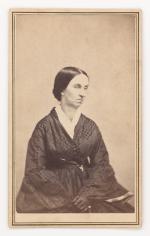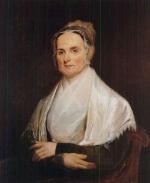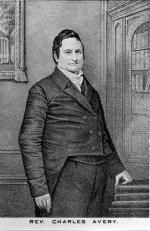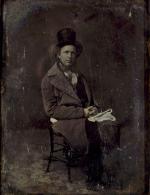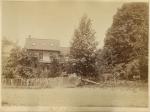![header=[Marker Text] body=[Renowned editor, abolitionist, Civil War nurse, advocate of women's rights and temperance. Also author of "Half a Century, 1815–1865." Born Jane Grey Cannon at Pittsburgh December 6, 1815; died in old homestead on this site on July 22, 1884.] sign](http://explorepahistory.com/kora/files/1/10/1-A-3E8-139-Swisshelm.jpg)
Mouse over for marker text
Name:
Jane Grey Swisshelm
Region:
Pittsburgh Region
County:
Allegheny
Marker Location:
Braddock & Greendale Aves., Edgewood, just N of I-376 exit 9
Dedication Date:
September 14, 1959
Behind the Marker
In the 1840s, a married woman in Pennsylvania could not legally possess land, money, furniture, china, or clothes, or take legal custody of her children. So when Jane Grey Cannon said "I do" in 1836, all of her material goods, both present and future, became the legal property of her new husband, James Swisshelm. In the 1840s, Jane would join the campaign to free both women and African Americans from the status of legal property. She then emerged as one of the most influential female journalists in the abolition and women’s-rights' movements.
Jane Grey Cannon Swisshelm was born on December 6, 1815, in Pittsburgh, Pennsylvania. Raised in a Scottish Covenanter community with stories about her Scottish ancestors’ rebellion against English authority, Swisshelm believed individuals had the responsibility to reject the authority of an unjust state. From an early age, she also learned of the immorality of slavery through the teachings of the family minister, John Black.
At twenty-one, Cannon married James Swisshelm. After two years of marriage, the couple moved to Louisville, Kentucky, where Swisshelm witnessed first-hand the horrors of slavery. "I promised the Lord then and there," she would later write, "that for life, it should be my work to bring deliverance to the captive, and the opening of the prison to them that they are bound."
After two unhappy years in Louisville, Swisshelm left her husband—against his wishes—and returned to Pittsburgh to care for her sick mother. "When he told me that he had a legal right to detain me, and would exercise it, I assured him the attempt would be dangerous as useless, for I was going to Pittsburgh."
Swisshelm’s mother died in January 1840, and left her estate to Jane and her sister. In 1845, Swisshelm decided to sell some land. When the purchasers demanded that both Jane’s and her sister’s husbands sign the deed, James Swisshelm refused unless the money was paid directly to him. Jane Swisshelm experienced firsthand how the law protected the interests of property owners and husbands, and left wives, like slaves, without basic rights.
Since returning to Pittsburgh, Swisshelm had written stories and poems under the name Jennie Deans for Neal's Saturday Gazette and The Dollar Newspaper, and contributed articles to The Spirit of Liberty, an anti-slavery weekly newspaper in Pittsburgh. Infuriated by her husband's greed, Swisshelm launched a campaign under her own name in the Pittsburgh Daily Commercial Journal to win women the right to own property.
To drive home the injustice of the laws in Pennsylvania, she told the story of a newlywed German merchant, who married the daughter of a farmer. Shortly after the wedding, the wife died. Her father asked for some of his daughter’s possessions to remember her by, but the husband refused, hoping to sell them. "Gentleman, these are your laws! Your English ancestors made them…You robbed that wife of her right to devise her own property—that husband is simply your agent"
simply your agent"
At the same time that Swisshelm was waging her campaign for women’s rights in Pittsburgh, Lucretia Mott and Mary Grew were campaigning for changes to state property laws in Philadelphia. Following New York's example, the Commonwealth legislature passed the Pennsylvania Married Woman’s Property Law in 1848, which granted women the right to retain property they possessed upon entering a marriage. The victory proved short-lived, however, for in 1852 the Pennsylvania Supreme Court ruled that deeds were void without a husband's signature. In 1854, the Court also ruled that married women’s earnings were not their own.
Lucretia Mott and Mary Grew were campaigning for changes to state property laws in Philadelphia. Following New York's example, the Commonwealth legislature passed the Pennsylvania Married Woman’s Property Law in 1848, which granted women the right to retain property they possessed upon entering a marriage. The victory proved short-lived, however, for in 1852 the Pennsylvania Supreme Court ruled that deeds were void without a husband's signature. In 1854, the Court also ruled that married women’s earnings were not their own.
When the Albatross, Pittsburgh's only anti-slavery newspaper, closed its doors in 1847, Swisshelm started her own abolitionist newspaper, the Pittsburgh Saturday Visiter, which soon reached thousands of readers in every state and territory, Canada, and England. This drew the attention of Horace Greeley, the publisher and editor of the New York Tribune, who in 1850 hired Swisshelm as the Tribune’s first regular female correspondent. Sent to Washington, D.C., to report on Congress, she successfully petitioned Vice-President Millard Fillmore to allow her to sit in the Senate press gallery, which came to pass in April 1850.
Despite her growing national celebrity, Swisshelm struggled to keep her own paper solvent. In 1854, she sold The Visiter, but continued to oversee the editorial page. Unable to make ends meet, Swisshelm headed west to the thriving town of St. Cloud, Minnesota, with her daughter, and asked her husband for a divorce. "I have lived over twenty years without the legal right to be alone," she wrote. James waited three years for his family to return, and then divorced Jane for desertion.
In St. Cloud, Swisshelm found a world quite different from that of Pittsburgh. There, as in other newly settled towns in America’s western territories, women had greater opportunities and freedoms, and could actively participate in public life. Swisshelm soon became the editor of the St. Cloud Visiter, and later the St. Cloud Democrat, writing on behalf of women’s rights and the abolition of slavery.
In 1863, in the midst of the Civil War, Swisshelm moved to Washington, D.C., where she worked as one of the first female clerks in the Quartermaster General’s office and helped care for wounded soldiers. Following the war, she remained in Washington to start another newspaper, The Reconstructionist. The paper soon ended, however, when an arsonist destroyed her pressroom and living quarters because of her harsh criticisms of Andrew Johnson and his reconstruction policy.
With no job and nowhere to live, Swisshelm successfully sued her ex-husband for selling portions of their property without her knowledge and won ownership of the old Swisshelm homestead, in Swissvale, just outside Pittsburgh. From 1868 onwards, she spent the rest of her life writing freelance articles, traveling, and speaking on behalf of women’s rights. Upon her death in 1884, newspapers throughout the country paid tribute to the pioneer feminist and abolitionist. It was not until 1887, three years after Jane Swisshelm’s death, that the Pennsylvania legislature passed a law that granted married women the same rights as unmarried women and the right to retain their own property.
Jane Grey Cannon Swisshelm was born on December 6, 1815, in Pittsburgh, Pennsylvania. Raised in a Scottish Covenanter community with stories about her Scottish ancestors’ rebellion against English authority, Swisshelm believed individuals had the responsibility to reject the authority of an unjust state. From an early age, she also learned of the immorality of slavery through the teachings of the family minister, John Black.
At twenty-one, Cannon married James Swisshelm. After two years of marriage, the couple moved to Louisville, Kentucky, where Swisshelm witnessed first-hand the horrors of slavery. "I promised the Lord then and there," she would later write, "that for life, it should be my work to bring deliverance to the captive, and the opening of the prison to them that they are bound."
After two unhappy years in Louisville, Swisshelm left her husband—against his wishes—and returned to Pittsburgh to care for her sick mother. "When he told me that he had a legal right to detain me, and would exercise it, I assured him the attempt would be dangerous as useless, for I was going to Pittsburgh."
Swisshelm’s mother died in January 1840, and left her estate to Jane and her sister. In 1845, Swisshelm decided to sell some land. When the purchasers demanded that both Jane’s and her sister’s husbands sign the deed, James Swisshelm refused unless the money was paid directly to him. Jane Swisshelm experienced firsthand how the law protected the interests of property owners and husbands, and left wives, like slaves, without basic rights.
Since returning to Pittsburgh, Swisshelm had written stories and poems under the name Jennie Deans for Neal's Saturday Gazette and The Dollar Newspaper, and contributed articles to The Spirit of Liberty, an anti-slavery weekly newspaper in Pittsburgh. Infuriated by her husband's greed, Swisshelm launched a campaign under her own name in the Pittsburgh Daily Commercial Journal to win women the right to own property.
To drive home the injustice of the laws in Pennsylvania, she told the story of a newlywed German merchant, who married the daughter of a farmer. Shortly after the wedding, the wife died. Her father asked for some of his daughter’s possessions to remember her by, but the husband refused, hoping to sell them. "Gentleman, these are your laws! Your English ancestors made them…You robbed that wife of her right to devise her own property—that husband is
At the same time that Swisshelm was waging her campaign for women’s rights in Pittsburgh,
When the Albatross, Pittsburgh's only anti-slavery newspaper, closed its doors in 1847, Swisshelm started her own abolitionist newspaper, the Pittsburgh Saturday Visiter, which soon reached thousands of readers in every state and territory, Canada, and England. This drew the attention of Horace Greeley, the publisher and editor of the New York Tribune, who in 1850 hired Swisshelm as the Tribune’s first regular female correspondent. Sent to Washington, D.C., to report on Congress, she successfully petitioned Vice-President Millard Fillmore to allow her to sit in the Senate press gallery, which came to pass in April 1850.
Despite her growing national celebrity, Swisshelm struggled to keep her own paper solvent. In 1854, she sold The Visiter, but continued to oversee the editorial page. Unable to make ends meet, Swisshelm headed west to the thriving town of St. Cloud, Minnesota, with her daughter, and asked her husband for a divorce. "I have lived over twenty years without the legal right to be alone," she wrote. James waited three years for his family to return, and then divorced Jane for desertion.
In St. Cloud, Swisshelm found a world quite different from that of Pittsburgh. There, as in other newly settled towns in America’s western territories, women had greater opportunities and freedoms, and could actively participate in public life. Swisshelm soon became the editor of the St. Cloud Visiter, and later the St. Cloud Democrat, writing on behalf of women’s rights and the abolition of slavery.
In 1863, in the midst of the Civil War, Swisshelm moved to Washington, D.C., where she worked as one of the first female clerks in the Quartermaster General’s office and helped care for wounded soldiers. Following the war, she remained in Washington to start another newspaper, The Reconstructionist. The paper soon ended, however, when an arsonist destroyed her pressroom and living quarters because of her harsh criticisms of Andrew Johnson and his reconstruction policy.
With no job and nowhere to live, Swisshelm successfully sued her ex-husband for selling portions of their property without her knowledge and won ownership of the old Swisshelm homestead, in Swissvale, just outside Pittsburgh. From 1868 onwards, she spent the rest of her life writing freelance articles, traveling, and speaking on behalf of women’s rights. Upon her death in 1884, newspapers throughout the country paid tribute to the pioneer feminist and abolitionist. It was not until 1887, three years after Jane Swisshelm’s death, that the Pennsylvania legislature passed a law that granted married women the same rights as unmarried women and the right to retain their own property.




